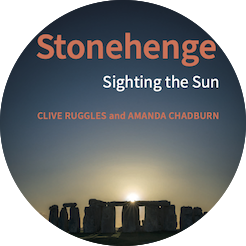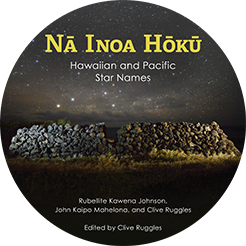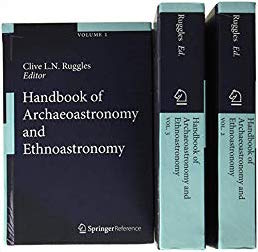
The Springer Handbook of Archaeoastronomy and Ethnoastronomy
General editor: Clive Ruggles
Section editors: Juan Antonio Belmonte, Stanisław Iwaniszewski, Alejandro López, Stephen C. McCluskey, John Steele and Sun Xiaochun
Published in 2014 by Springer
This three-volume reference work aims to provide a definitive picture of the state of art of research in this field, and to be a reliable and wide-ranging source regarding theory, method, interpretation, and best practice.
Published in both electronic and printed form, it is suitable for academic readers and researchers regardless of their disciplinary expertise, and will also be accessible to students and serious general readers.
Full contents list
The 217 articles listed below are accessible on-line at Springer Link if your institution has the relevant subscription.
Part III: Pre-Columbian and indigenous North America
Part IV: Pre-Columbian and indigenous Mesoamerica
Part V: Pre-Columbian and indigenous South America
Part VI: Indigenous and Islamic astronomy in Africa
Part VII: Prehistoric Western Europe
Part VIII: Prehistoric Central and Eastern Europe and Central Asia
Part IX: Ancient Egypt and the Classical World
Part X: Traditional astronomies in medieval and early modern Europe
Part XII: India and the Islamic Near East
Part XIII: China and the Far East
Part XIV: Oceania, Australasia and the Malay Archipelago
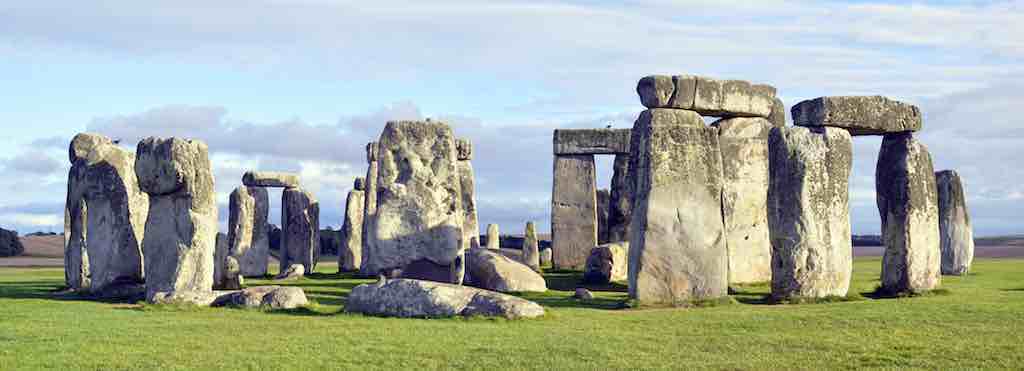
Stonehenge, United Kingdom (Photo © Clive Ruggles)
Part I: Themes and issues
- Concepts of space, time and the cosmos by Stanisław Iwaniszewski
- Calendars and astronomy by Clive Ruggles
- Astronomy and chronology—Babylonia, Assyria, and Egypt by Rolf Krauss
- Astronomy and navigation by Fernando Pimenta
- Astronomy and power by Edwin C. Krupp
- Astronomy and politics by John Steele
- Astrology as cultural astronomy by Nicholas Campion
- Astronomy, astrology and medicine by Dorian Greenbaum
- Ancient “observatories”—a relevant concept? by Juan Antonio Belmonte
- Origins of the “Western” constellations by Roslyn Frank
- Astronomy in the service of Christianity by Stephen C. McCluskey
- Astronomy in the service of Islam by David King
- Interaction between “indigenous” and “colonial” astronomies: adaption of indigenous astronomies in the modern world by Alejandro López
- Development of archaeoastronomy in the English-speaking world by Alun Salt
- Disciplinary perspectives on archaeoastronomy by Stephen C. McCluskey
- Astronomy and rock art studies by William Breen Murray
- Presentation of archaeoastronomy in introductions to archaeology by Victor B. Fisher
- Archaeoastronomical concepts in popular culture by Edwin C. Krupp
- Astrotourism and archaeoastronomy by Stanisław Iwaniszewski
- Archaeoastronomical heritage and the World Heritage Convention by Michel Cotte
Part II: Methods and practice
- Cultural interpretation of archaeological evidence relating to astronomy
by Stanisław Iwaniszewski - Cultural interpretation of historical evidence relating to astronomy
by Stephen C. McCluskey - Cultural interpretation of ethnographic evidence relating to astronomy
by Alejandro López - Nature and analysis of material evidence relevant to archaeoastronomy
by Clive Ruggles - Best practice for evaluating the astronomical significance of archaeological sites
by Clive Ruggles - Techniques of field survey by Frank Prendergast
- Analyzing orientations by Clive Ruggles
- Analyzing light-and-shadow interactions by Stephen C. McCluskey
- Visualization tools and techniques by Georg Zotti
- Basic concepts of positional astronomy by Clive Ruggles
- Long-term changes in the appearance of the sky by Clive Ruggles
- Solar alignments—identification and analysis by Juan Antonio Belmonte
- Lunar alignments—identification and analysis by César González
- Alignments upon Venus (and other planets)—identification and analysis by Ivan Šprajc
- Stellar alignments—identification and analysis by Clive Ruggles

Pueblo Bonito, Chaco Canyon, USA (Photo © Clive Ruggles)
Part III: Pre-Columbian and indigenous North America
- Inuit astronomy by John MacDonald
- Medicine Wheels of the Great Plains by David Vogt
- Hohokam archaeoastronomy by Todd W. Bostwick
- Mesa Verde archaeoastronomy by Gregory E. Munson
- Great Houses and the sun—the astronomy of Chaco Canyon by Kim Malville
- Rock Art of the greater southwest by Edwin C. Krupp
- Hopi and Anasazi alignments and rock art by Bryan C. Bates
- Sun-dagger sites by Ray Williamson
- Diné (Navajo) ethno- and archaeoastronomy by Von Del Chamberlain
- Pueblo ethnoastronomy by Ray Williamson
- Hopi and Puebloan ethnoastronomy and ethnoscience by Stephen C. McCluskey
- Astronomy and rock art in Mexico by William Breen Murray
- Boca de Potrerillos by William Breen Murray
Part IV: Pre-Columbian and indigenous Mesoamerica
- Astronomical deities in ancient Mesoamerica by Susan Milbrath
- Astronomy in the Dresden Codex by Gabrielle Vail
- Counting lunar phase cycles in Mesoamerica by Stanisław Iwaniszewski
- Astronomical correlates of architecture and landscape in Mesoamerica by Ivan Šprajc
- Astronomy at Teotihuacan by Stanisław Iwaniszewski
- Pecked cross-circles by Stanisław Iwaniszewski
- Templo Mayor, Tenochtitlan—Calendar and astronomy by Jesús Galindo Trejo
- Cave of the astronomers at Xochicalco by Arnold Lebeuf
- Colonial Zapotec calendars and calendrical astronomy by John S. Justeson
- Layout of ancient Maya cities by Grant Aylesworth
- Governor’s Palace at Uxmal by Ivan Šprajc
- E-Group arrangements by Grant Aylesworth

The thirteen towers of Chankillo, Peru (Photo © Clive Ruggles)
Part V: Pre-Columbian and indigenous South America
- Pre-Inca astronomy in Peru by Kim Malville
- Chankillo by Iván Ghezzi and Clive Ruggles
- Geoglyphs of the Peruvian coast by Clive Ruggles
- Inca astronomy and calendrics by David Dearborn and Brian Bauer
- Inca calendar by Mariusz Ziółkowski
- Ceque system of Cuzco—a yearly calendar-almanac in space and time by R. Tom Zuidema
- Inca Royal Estates in the Sacred Valley by Kim Malville
- Machu Picchu by Kim Malville
- Island of the Sun—Elite and non-elite observations of the June solstice by David Dearborn and Brian Bauer
- Inca moon—some evidence for lunar observations in Tahuantinsuyu by Mariusz Ziółkowski, Jacek Kosciuk and Fernando Astete
- Observations of comets and eclipses in the Andes by Mariusz Ziółkowski
- Landscape, mountain worship and astronomy at Socaire by Ricardo Moyano
- Skyscape of an Amazonian diaspora: Arawak astronomy in historical comparative perspective by Fabiola Jara
- Astronomy in Brazilian ethnohistory by Flávia Pedroza Lima
- Ticuna astronomy, mythology and cosmovision by Priscila Faulhaber
- Moxos’ lagoons by Juan Antonio Belmonte and Josep Barba
- “Chiriguano” astronomy—Venus and a Guarani new year by Gonzalo Pereira
- Astronomy and cosmology of the Guaraní of southern Brazil by Flávia Cristina de Mello
- The sky among the Toba of western Formosa (Gran Chaco, Argentina) by Cecilia Gómez
- Astronomy in the Chaco region, Argentina by Alejandro López
- Ethnoastronomy in the multicultural context of the agricultural colonies in northern Santa Fe province, Argentina by Armando Mudrik
- Selk'nam astronomy by Sixto Giménez Benítez
Part VI: Indigenous and Islamic astronomy in Africa
- Cultural astronomy in Africa south of the Sahara by Jarita Holbrook
- Indigenous astronomy in southern Africa by Thebe Medupe
- “Reading” central African skies: a case study from southeastern DRC by Allen F. Roberts
- Mursi and Borana calendars by Clive Ruggles
- Yoruba ethnoastronomy—“Orisha/Vodun’” or how people’s conceptions of the sky constructed science by Aimé Dafon Segla
- Pre-Islamic dry-stone monuments of the central and western Sahara by Yves Gauthier
- Astronomy at Nabta Playa, southern Egypt by Kim Malville
- Pre-Islamic religious monuments in North Africa by César Esteban
- Astronomy as practiced in West African city of Timbuktu by Thebe Medupe
- Calendar pluralism and the cultural heritage of domination and resistance (Tuareg and other Saharans) by Clare Oxby
- Pre-hispanic sanctuaries in the Canary Islands by Juan Antonio Belmonte
- A modern myth—the “pyramids” of Güímar by Antonio Aparicio and César Esteban

View of the skyline from the interior of the painted cave of La Candelaria, Gran Canaria, Spain (Photo © Clive Ruggles)
Part VII: Prehistoric Western Europe
- Patterns of orientation in the megalithic tombs of the western Mediterranean
by Michael Hoskin - Seven-stone antas by Michael Hoskin
- Megalithic cromlechs of Iberia by Fernando Pimenta and Luís Tirapicos
- Iberian sanctuaries by César Esteban
- Taula sanctuaries of Menorca by Michael Hoskin
- Celtic sites of central Iberia by Manuel Pérez
- Basque saroiak by Luis Mari Zaldua
- Possible calendrical inscriptions on Palaeolithic artifacts by Michael Rappenglück
- Possible astronomical depictions in Franco-Cantabrian Palaeolithic rock art
by Michael Rappenglück - Astronomical symbolism in Bronze-Age and Iron-Age rock art by Marco García Quintela and Manuel Santos
- Stonehenge and its landscape by Clive Ruggles
- The Neolithic and Bronze Age monument complex of Thornborough, North Yorkshire, UK by Jan Harding
- Irish Neolithic tombs in their landscape by Frank Prendergast
- Boyne valley tombs by Frank Prendergast
- Recumbent stone circles by Clive Ruggles
- Scottish short stone rows by Clive Ruggles
Part VIII: Prehistoric Central and Eastern Europe and Central Asia
- TRB megalithic tombs and long barrows in central Europe by Stanisław Iwaniszewski
- Neolithic longhouses and Bronze Age houses in central Europe by Emilia Pásztor and Judit Barna
- Neolithic circular ditch systems (“rondels”) in central Europe by Emilia Pásztor, Judit Barna and Georg Zotti
- Celestial symbolism of the Vučedol culture by Emília Pásztor
- Celestial symbolism in central European later prehistory—case studies from the Bronze Age Carpathian Basin by Emília Pásztor
- Nebra Disk by Emília Pásztor
- Lessons of Odry by Stanisław Iwaniszewski
- Astronomical orientation in the ancient Dacian sanctuaries of Romania
by Florin Stanescu - Astronomy in the Bulgarian Neolithic by Alexey Stoev and Penka Maglova
- Thracian sanctuaries by Penka Maglova and Alexey Stoev
- Thracian dolmens by César González, Dimiter Kolev and Vesselina Koleva
- Sardinian nuraghes by Mauro Peppino Zedda
- Nuraghic well of Santa Cristina, Paulilatino, Oristano, Sardinia by Arnold Lebeuf
- Temples of Malta by Frank Ventura and Michael Hoskin
- Minoan astronomy by Mary Blomberg and Göran Henriksson
- Astronomy in the ancient Caucasus by Irakli Simonia and B. Jijelava
- Carahunge: a critical assessment by César González
- Observational and cult sites in pre-Christian Georgia by Irakli Simonia, B. Jijelava, and G. Gigauri

Zorats Karer (Carahunge), Armenia (Photo © Clive Ruggles)
Part IX: Ancient Egypt and the Classical World
- Egyptian cosmology and cosmogony by James Allen
- Egyptian constellations by José Lull and Juan Antonio Belmonte
- Ancient Egyptian calendars by Anthony Spalinger
- Egyptian “star clocks” by Sarah Symons
- Orientation of Egyptian temples—an overview by Juan Antonio Belmonte
- Monuments of the Giza plateau by Clive Ruggles
- Karnak by Juan Antonio Belmonte
- Kingdom of Kush by Juan Antonio Belmonte
- Greek cosmology and cosmogony by Alexander Jones
- Greek constellations by Stamatina Mastorakou
- Ancient Greek calendars by Robert Hannah
- Greek temples and rituals by Efrosyni Boutsikas
- Greek mathematical astronomy by Alexander Jones
- Material culture of Greek and Roman astronomy by James Evans
- Reconstructing the Antikythera mechanism by Tony Freeth
- Greco-Roman astrometeorology by Daryn Lehoux
- Greco-Roman astrology by Roger Beck
- Etruscan divination and architecture by Giulio Magli
- Roman city planning and spatial organization by César González and Giulio Magli
- Light at the Pantheon by Robert Hannah and Giulio Magli
- Nemrud Dag by Juan Antonio Belmonte and César González
- Mithraism by Roger Beck
Part X: Traditional astronomies in medieval and early modern Europe
- Skylore of the indigenous peoples of northern Eurasia by Roslyn Frank
- Qibla in the Mediterranean by Mònica Rius
- Interactions between Islamic and Christian astronomical traditions in the Iberian Peninsula by César González and Juan Antonio Belmonte
- Orientation of Christian churches by Stephen C. McCluskey
- Orientation of English early medieval parish churches by Peter Hoare
- Church orientations in Slovenia by Saša Čaval
- Church orientations in central and eastern Europe by Rimvydas Laužikas
- Role of light–shadow hierophanies in early medieval art by Kirsten Ataoguz
- Light–shadow interactions in Italian medieval churches by Manuela Incerti
- Lost skies of Italian folk astronomy by Piero Barale
- Folk calendars in the Balkan region by Dimiter Kolev
- Wooden calendar sticks in eastern Europe by Vesselina Koleva and Svetlana Koleva
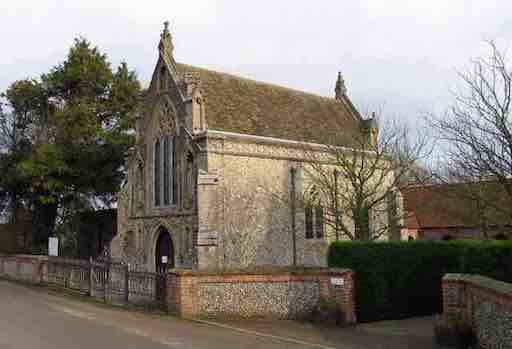
Slipper (St. Catherine’s) chapel, Houghton St. Giles, United Kingdom. (Photo by John Salmon, wikimedia commons licence)
Part XI: Ancient Near East
- Orientation in Hittite monuments by César González and Juan Antonio Belmonte
- Orientation of Phoenician temples by José Luis Escacena
- Astronomy in the Levant during the Bronze Age and Iron Age by Andrea Polcaro
- Petra and the Nabateans by Juan Antonio Belmonte and César González
- Mesopotamian cosmogony and cosmology by Wayne Horowitz
- Mesopotamian star lists by Wayne Horowitz
- Mesopotamian celestial divination by Lorenzo Verderame
- Mesopotamian calendars by John Steele
- Astronomy, divination and politics in the Neo-Assyrian empire by Lorenzo Verderame
- Babylonian observational and predictive astronomy by John Steele
- Babylonian mathematical astronomy by Mathieu Ossendrijver
- Late Babylonian astrology by John Steele
- Transmission of Babylonian astronomy to other cultures by Alexander Jones
- Ancient and medieval Jewish calendars by Sacha Stern
- Astronomy in the Book of Enoch by Jonathan Ben-Dov
- Astronomy and calendars at Qumran by Jonathan Ben-Dov
- Ancient Persian skywatching and calendars by Arkadiusz Sołtysiak
Part XII: India and the Islamic Near East
- Islamic mathematical astronomy by Clemency Montelle
- Islamic astronomical instruments and observatories by Tofigh Heidarzadeh
- Islamic folk astronomy by Petra Schmidl
- Folk astronomy and calendars in Yemen by Daniel Martin Varisco
- Star clocks and water management in Oman by Harriet Nash
- Astronomy of the Vedic Age by Yukio Ôhashi
- Use of astronomical principles in Indian temple architecture by BS Shylaja
- Astronomy of Indian cities, temples and pilgrimage centers by Kim Malville
- Mathematical astronomy in India by Kim Plofker
- Vākya system of astronomy by MS Sriram
- Kerala school of astronomy by K Ramasubramanian
- Astronomical instruments in India by SR Sarma
- Observatories of Sawai Jai Singh II by Susan N. Johnson-Roehr
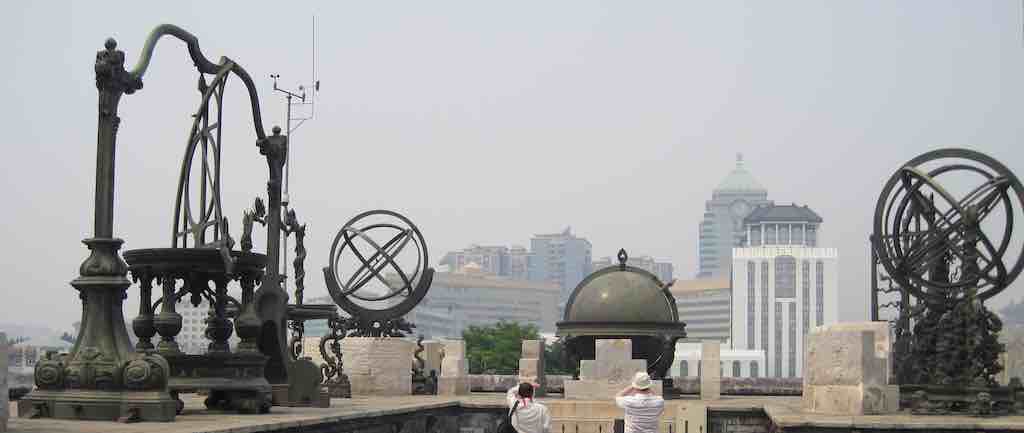
Bronze instruments from the Qing dynasty on the brick platform at Beijing Ancient Observatory, China (Photo © Clive Ruggles)
Part XIII: China and the Far East
- Ancient Chinese astronomy—an overview by Shi Yun-li
- Observations of celestial phenomena in ancient China by Sun Xiaochun
- Chinese constellations and star maps by Sun Xiaochun
- Chinese calendar and mathematical astronomy by Sun Xiaochun
- Shang oracle bones by David Pankenier
- Excavated documents dealing with Chinese astronomy by Guan Yuzhen
- Astronomy and city planning in China by David Pankenier
- Gnomons in ancient China by Li Geng
- Taosi observatory by Sun Xiaochun
- Dengfeng large gnomon by Xu Fengxian
- Ancient Chinese sundials by Deng Kehui
- Chinese armillary spheres by Sun Xiaochun
- Water-powered astronomical clock tower by Sun Xiaochun
- Beijing ancient observatory by Shi Yun-li
- Astronomical aspects of Korean dolmens by Yang Hong-Jin
- Korean astronomical calendar, Chiljeongsan by Lee Eun-Hee
- Striking clepsydras by Nam Moon-Hyon
- Song I-Yeong’s armillary clock by Kim Sang-Hyuk and Lee Yong-Sam
- Cultural astronomy in Japan by Steven L. Renshaw
Part XIV: Oceania, Australasia and the Malay Archipelago
- Cultural production of skylore in Indonesia by Gene Ammarell
- Australian aboriginal astronomy—an overview by Ray Norris and Duane Hamacher
- Australian aboriginal astronomy and cosmology by Philip A. Clarke
- Archaeoastronomy in Polynesia by Clive Ruggles
- Ancient Hawaiian astronomy by Clive Ruggles
- Archaeoastronomy of Easter Island by Edmundo Edwards










